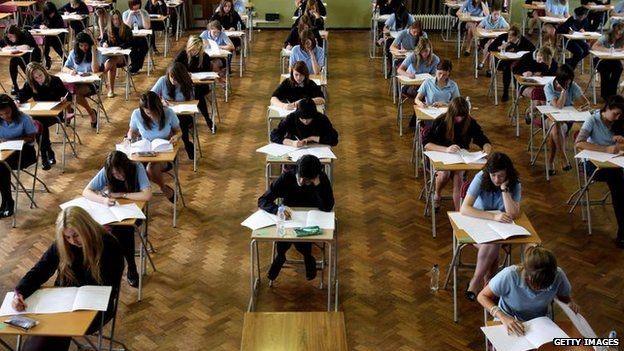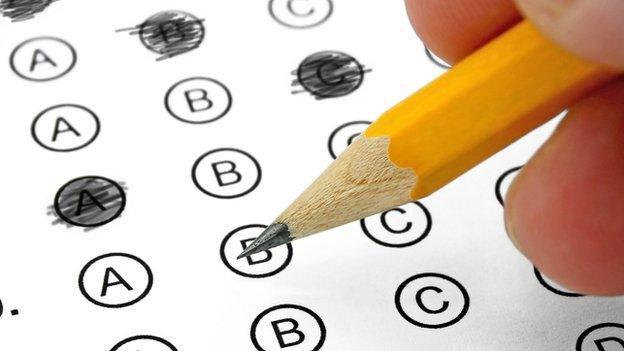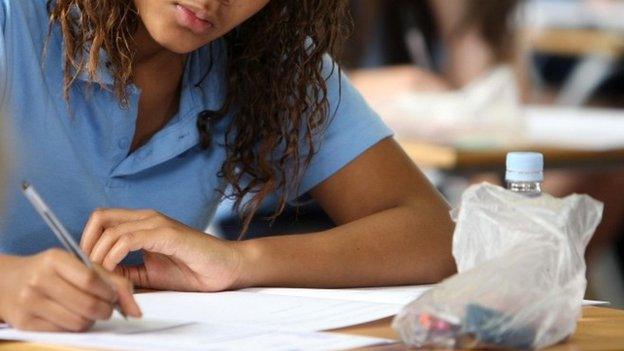GCSEs: Where are we up to with all the changes?
- Published

The results of this summer's GCSEs exams are released on Thursday
Hundreds of thousands of pupils in England, Wales and Northern Ireland receive their GCSE results on Thursday. Teenagers in Scotland received the results of their equivalent National 4s and 5s earlier this month.

There have been a lot of changes to exams lately. Have there been any changes to GCSEs this year?
The exam regulator, Ofqual, says there were few changes to GCSEs this summer compared with recent years.
Last year, however, saw the return to linear GCSE exams, with all pupils sitting their tests in the summer at the end of the two-year course, rather than taking exams on the various parts of the qualification at several points during their courses.
One change this year is that GCSE English literature and history syllabuses required teenagers to study the full curriculum - some previous syllabuses had allowed for a narrower range of content to be studied.


There has been an expected fall in the number of pupils sitting GCSEs early
Has there been any change in entry patterns?
While there are relatively few changes to qualifications this summer, there are some changes in entry patterns at GCSE.
Ofqual says the overall entry for GCSEs in England has decreased from 5,085,000 in 2014 to 4,916,000 this year.
Early entries (for students in Year 10 or below) has fallen over the same period by 32%, from 504,000 to 344,000.
This reflects a government move to discourage schools from entering pupils early for exams.
The number of students entering GCSE English literature or English has fallen when compared to last year, while the number of students entering IGCSE English language has risen.

Aren't GCSE grades changing soon?
Yes, GCSEs will soon be graded from 9-1, external, rather than the current A*-G.
Students starting GCSE courses this September in maths, English and English literature will get the new grades when they receive their results in the summer of 2017.
The new grades will come in for most other common GCSEs the following year.
This will apply to subjects such as biology, chemistry, physics, computer science, languages, religious education, geography, music and history, which will be taught from September 2016, with exams taken in the summer of 2018.
There will be a third wave of 9-1 graded GCSEs sat in summer 2019 for courses taught from September 2017.
These include subjects such as psychology, ancient history, business, information and communications technology (ICT) and media studies.

What should I do if I am getting my GCSE results on Thursday?
You may get your results by text, email or in the post, but it's still a good idea to go to your school or college on results day. By doing this, you can get help and advice from your teachers.


Pupils have the option to resit exams in the autumn
Do I have to stay on at school or college?
If you live in England, yes. This summer's GCSE cohort in England (born between 1 September 1998 and 31 August 1999) is the second to have to stay on in education or employment with training until the age of 18.
The Department for Education raised the participation age in England in two stages. The first stage meant pupils who left Year 11 in the summer of 2013 had to continue in education or training for at least another year until June 2014. The second phase saw pupils who left Year 11 in summer 2014 or later have to continue until at least their 18th birthday.
However, if you live in Wales, Scotland or Northern Ireland, it is a different picture.
In Scotland, if you turn 16 between 1 March and 30 September, you can leave school after 31 May of that year. If you turn 16 between 1 October and the end of February, you can leave at the start of the Christmas holidays in that school year.
In Wales, you can leave school on the last Friday in June, as long as you will be 16 by the end of that school year's summer holidays.
In Northern Ireland, if you turn 16 during the school year (between 1 September and 1 July), you can leave school after 30 June. If you turn 16 between 2 July and 31 August, you cannot leave school until 30 June the following year.

What can I do if I don't have the grades needed for A-level or vocational courses?
Try not to panic. If you don't get the grades asked for by the sixth-form or college of your choice, approach the staff there and see if they are prepared to be flexible. It's possible they will still give you a place or they might be prepared to take you on for different courses. Alternatively, approach other schools or colleges - you might find they will accept you.

Can I resit?
Students will be able to resit GCSEs in maths and English in November. Ofqual says there is an expectation that anyone sitting the examinations offered in November will be aged 16. The regulator says resits will not be available in November for any other subjects.


Re-sits are available in maths and English in November
Can I challenge my results?
If you feel strongly that your grades are wrong and do not reflect your ability, you can ask for a re-mark of your papers. Requests for re-marking can only be done through your school or college. Make sure someone there is dealing with the matter. There is a fee for this service, which is reimbursed only if there is a grade change. The Joint Council for Qualifications has guidelines on the post-results service, external available to schools.

Where can I go for more advice?
You can call the national Exam Results Helpline on 0808 100 8000 or speak to an adviser from the National Careers Service on 0800 100 900.
The government website Gov.UK, external might also help you make decisions.